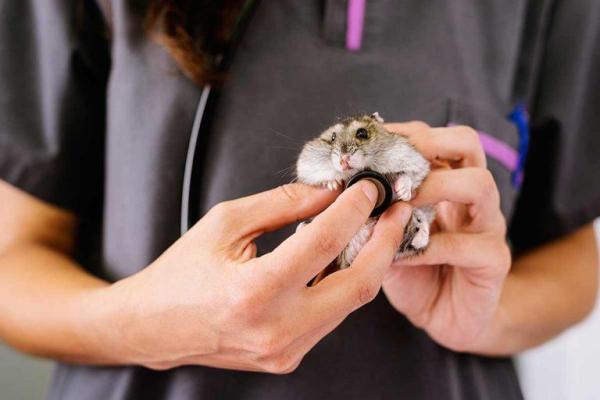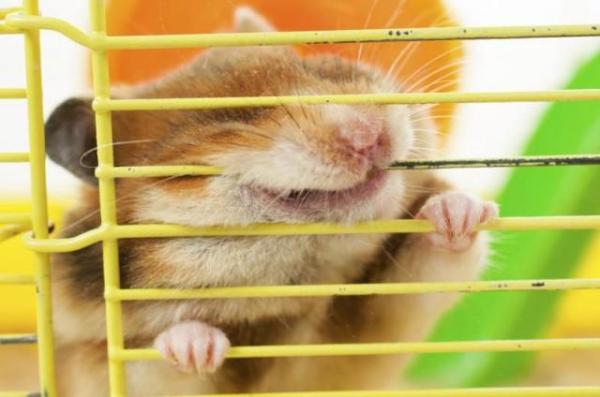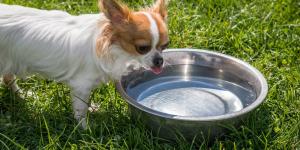Hamster Not Eating Or Drinking - Causes



See files for Hamsters
If you share your home with one or more hamsters, you’ll already know that these animals have an insatiable appetite. This is why hamsters often gain weight quickly and are prone to obesity. If your hamster is not eating or drinking, it’s not normal. A hamster not eating is in fact a cause for concern. Lack of appetite in hamsters is a symptom of several hamster diseases so if you notice your hamster is not eating or drinking, take note.
Are you are wondering, ‘‘Is my hamster sick or dying?’’ Keep reading here at AnimalWised to find out the causes behind a hamster not eating or drinking and what this may signify about your hamster’s health status.
Hamster not eating much: a sick hamster
Is your hamster sick or dying? As we’ve already mentioned, the loss of appetite in hamsters may indicate that your hamster is sick. Hamsters are small rodents that are very sensitive and can catch infections, abscesses, parasites, fungi, colds, respiratory problems, and other diseases very easily.
Sick hamster symptoms:
- Weight-loss
- Diarrhea
- Vomiting
- Excessive scratching
- Cracked skin
- Reddened skin
- Skin inflammation
- Injuries
- Blisters
- Hair-loss
- Baldness
- Hyperactivity
- Aggressiveness
- Depression
- Isolation
- Nervousness
- Excessive fear
- Destructiveness
- Lack of appetite
If you notice that your hamster does not want to eat or drink, in addition to any of these other symptoms we have just mentioned, take note. In any of these above cases, you should go to the veterinarian as soon as possible. A professional will be able to diagnose the problem correctly and treat it accordingly.
For more, we recommend taking a look at our article where we discuss how long do hamster live for.

Why is my hamster not eating food
Although hamsters generally have a big appetite and are usually quite flexible with regards to their diet, you might occasionally notice that your hamster won’t eat. If your hamster is not eating, the first thing we recommend doing is taking a look at their diet. Is your hamster’s diet monotonous?
There is a large possibility that your hamster is bored with his/her diet. Hamsters need and enjoy a varied diet which meets their full nutritional requirements. While you can buy a feed at your local pet store, we recommend also offering your hamster natural and fresh foods. Some fresh and natural foods hamster can eat include:
- Bananas
- Cucumber
- Carrots
- Brocolli
- Cauliflower
For more, take a look at our article where we answer the questions of, ‘‘What do hamsters eat?’’
Hamster not eating: heat
Almost all animals, especially mammals, reduce their food intake during hotter days (summer). If your hamster is not eating food because it’s very hot, don’t force it to eat. Instead, we recommend offering your hamster fresh foods which are rich in water in order to keep it hydrated. does not want to eat your food because it is very hot, you should not force it but you can offer fresh foods rich in water to keep it well hydrated. Fruits that hamsters can eat include:
- Watermelon: Many people wonder, ‘‘Can hamsters eat watermelon?’’ In small doses, Yes. If you give your hamster TOO much watermelon, it can cause vomiting or diarrhea.
- Apples.
- Kiwi fruit.
- Peaches.
With the arrival of summer, you should also be vigilant and avoid heat stroke in hamsters. Heat stroke in hamsters can be fatal! In addition to controlling the temperature of your hamster’s environment, it is essential that you ALWAYS provide your hamster with clean fresh water. Remember to always place your hamster’s cage in a cool environment where it doesn’t receive direct sunlight. For more, we recommend reading our article where we tell you everything you need to know about preparing a hamster’s cage.
My hamster won’t eat: stress
As we’ve already mentioned, hamsters are sensitive animals that can easily be affected by environmental and routine changes. If your hamster’s cage is not filled with physical and mental enrichment to play and exercise with, it can result in hamster stress.
Stress in hamster symptoms include:
- Hyperactivity, nervousness or anxiety.
- An increase in unusual habits, such as biting its cage.
- Changes in appetite: When feeling nervous or hyperactive, some hamsters will eat more while others eat less or nothing at all.
- Hamster behavior problems: by failing to release stress positively, many hamsters begin to act in an obsessive and repetitive manner, known commonly as stereotyping in hamsters.
- Additional behavioral problems: aggressiveness is one of the most common symptoms of stress in hamsters. Aggression in hamster can also be associated with certain diseases. Therefore, if your hamster tries to bite you, we recommend consulting your veterinarian as soon as possible.
On the other hand, hamsters can become very sad and depressed when they don’t receive accurate care. A sad or depressed hamster may:
- Lose interest in food.
- Reduce daily physical activity.
- Isolate itself.
To provide your hamster with an active and healthy life, make sure that it is constancy stimulated with games and cage toys. This is in addition to making sure your hamster receives a good-quality diet and adequate hygiene.
For more about hamster stress and behavioral changes in hamsters, take a look at:

Hamster not eating or drinking: causes
Is your new hamster not eating? How about your old hamster not eating? In addition to the above mentioned causes, hamsters may also lose appetite due to:
- Poisoning in hamsters: if your hamster has consumed any toxic plant or forbidden food, it will develop symptoms such as vomiting, diarrhea, weakness, muscle stiffness, among others. If you believe that your hamster has ingested a toxic substance, make sure to take it to the veterinarian immediately. For more, make sure you know about forbidden food for hamsters.
- Dental problems in hamsters: rodents, like hamsters, need to regularly wear their teeth. Did you know that a hamster’s teeth never stop growing? If a hamster does not have branches or snacks to wear its teeth, it can develop into irregular growths or breakages. Consequently, some symptoms will appear, including a decline in appetite.
- Lack of hamster cage hygiene: if your hamster's cage has accumulated a lot of dirt, impurities or excrement, it is possible that your hamster won’t eat. In addition, inadequate hygiene can favor the proliferation of pathogens, as well as causing stress in the hamster. Therefore, remember to clean your hamster’s cage regularly, removing waste and stool. We also recommend cleaning out and sanitizing your hamster’s cage with warm water and soap once a week.
- Constipation: A constipated hamster may refuse to eat or eat very little. Constipation in hamsters is often caused by a diet poor in fiber, insufficient water consumption or hair ingestion. To help, include fiber-rich fruits and vegetables into your hamster’s diet, such as plums, pears, lettuce and spinach.
Is my hamster sick or dying?
Symptoms of a sick hamster cannot be ignored. If you notice any of these symptoms, we recommend consulting a veterinarian as soon as possible:
- If your hamster does not eat or drink water for more than 24 hours.
- A lethargic hamster not eating.
- A hamster not eating or drinking with diarrhea.
In these such cases it is vital to go to a veterinarian immediately. These such symptoms can be a signal of disease which can result in the hamster’s death.

Hamster facts
If you found this article helpful, you’ll love our video below where we discuss some fun and helpful information about hamsters:

This article is purely informative. AnimalWised does not have the authority to prescribe any veterinary treatment or create a diagnosis. We invite you to take your pet to the veterinarian if they are suffering from any condition or pain.
If you want to read similar articles to Hamster Not Eating Or Drinking - Causes, we recommend you visit our Other health problems category.








